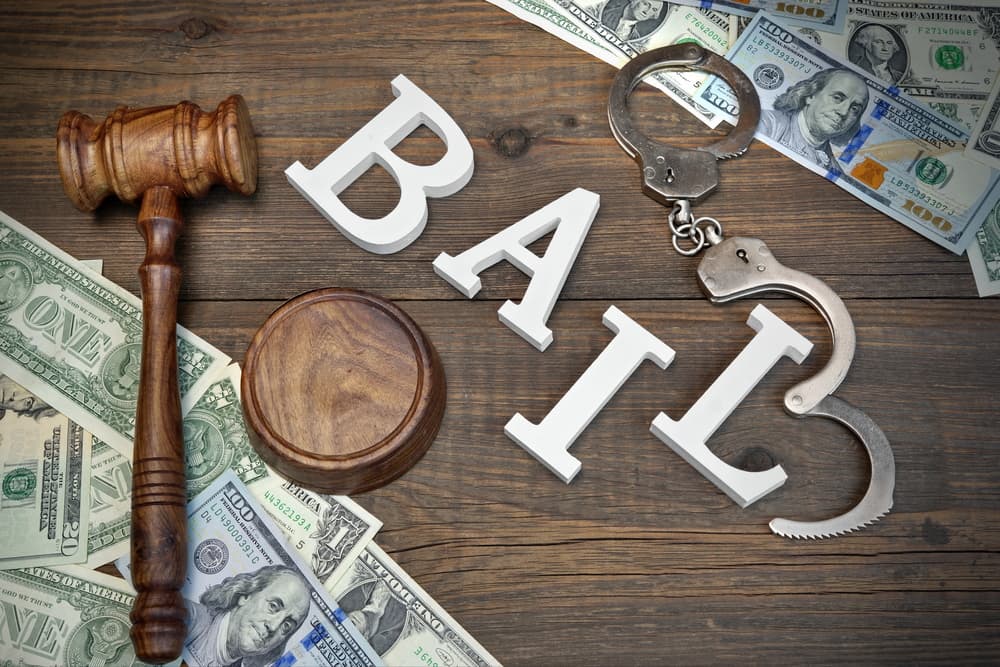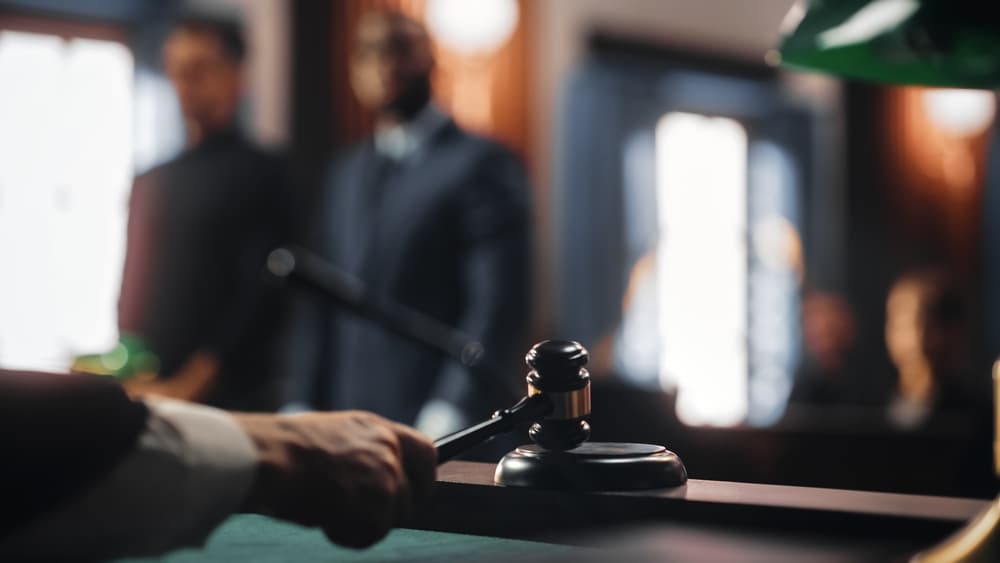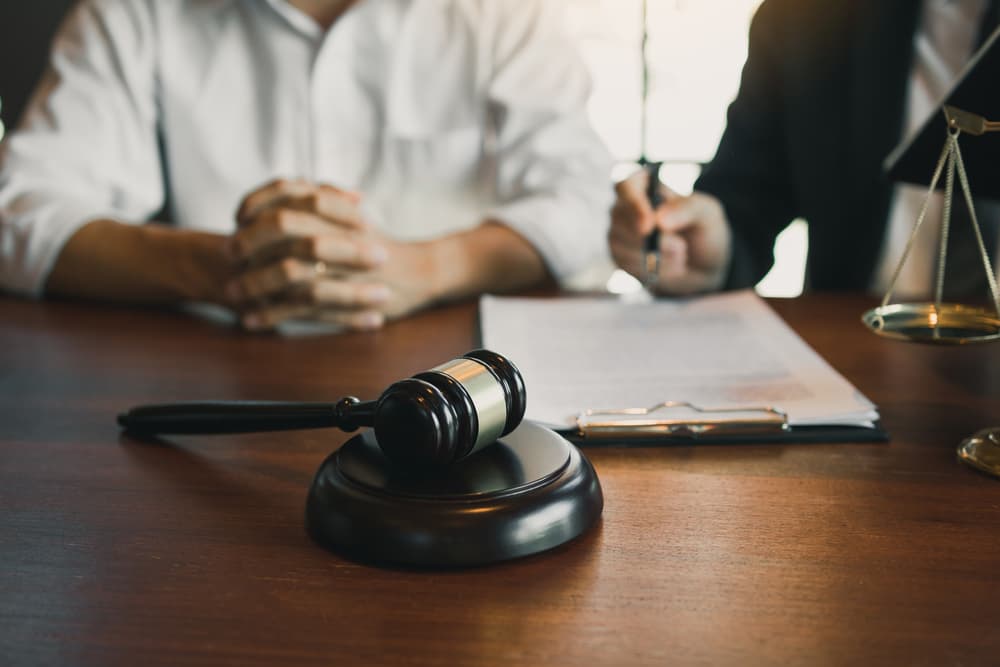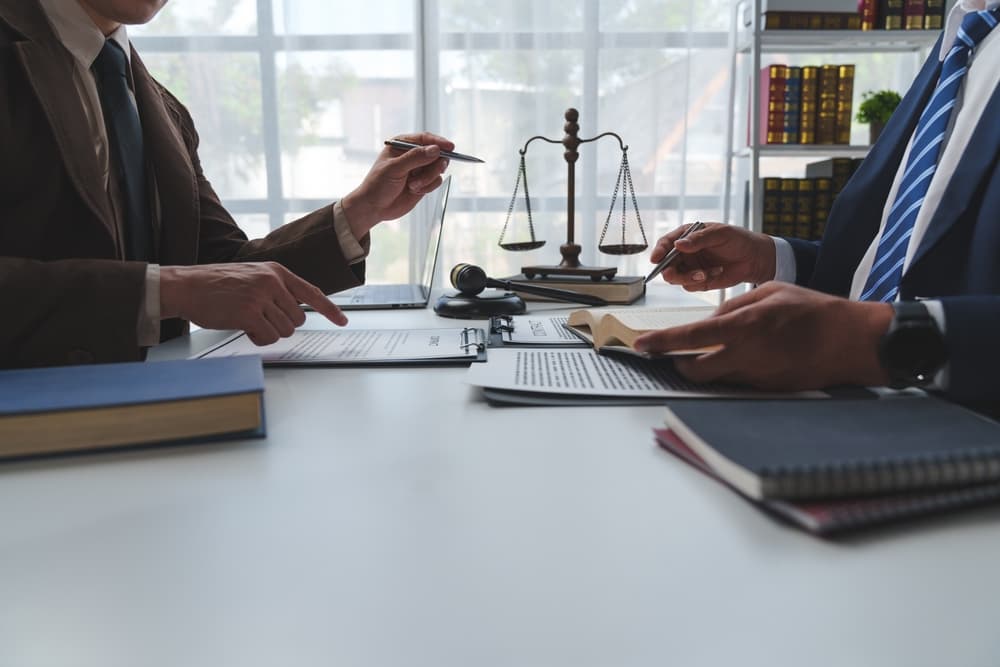In California, bail is money paid to the court to ensure an accused individual’s (defendant’s) appearance at future court dates. If paid in full, it’s refunded after the case concludes.
A bond, typically from a bail bond agent, covers the full bail amount if the defendant can’t pay. The agent charges a fee (usually 10 percent) and may require collateral. If the defendant doesn’t appear, the agent pays the full bail, forfeiting the fee and collateral.
At the beginning of a criminal case, defendants must typically attend a bail hearing. A knowledgeable criminal defense attorney can represent you at this hearing – and throughout your case – to pursue the best possible result on your behalf. Your freedom very much depends on your defense representation.
Factors That May Affect the Amount of Bail in a California Criminal Case

In California, the bail amount set in a criminal case can vary widely based on several key factors. These factors determine whether a defendant remains in custody while awaiting trial or is released on bail.
Here are some of the primary considerations:
- The Offense's Severity – The crime's nature and seriousness significantly influence the bail amount. More severe offenses, such as violent crimes or felonies, generally result in higher bail amounts than misdemeanors or non-violent crimes. For instance, bail for murder or assault charges is typically set much higher than for theft or minor drug offenses.
- Criminal History – A defendant’s criminal record plays a significant role in bail determinations. Those with prior convictions or bail violations may face higher bail amounts. Conversely, individuals with a clean record or minimal prior offenses may be eligible for lower bail amounts or even release on their own recognizance (OR).
- Flight Risk - The likelihood that a defendant will flee before trial is a critical factor. Factors such as ties to the community, employment status, and family responsibilities are considered. Defendants deemed flight risks may face higher bail amounts or stricter conditions to ensure their appearance for court proceedings.
- Public Safety Concerns - If a defendant poses a danger to the community, bail may be higher or denied altogether. The court scrutinizes crimes involving weapons, violence against others, or offenses that threaten public safety more closely.
- Financial Resources - A defendant's ability to pay bail is also considered. Bail amounts are set at levels to ensure defendants appear in court while reflecting their financial means. Wealthier defendants may face higher bail amounts to discourage flight, while indigent defendants may seek reduced bail or alternative release conditions.
- Pretrial Services Reports – In many cases, courts rely on pretrial services agencies to assess the defendant’s background and recommend bail conditions. These reports can influence the judge’s decision on bail amount and release conditions.
- Court Discretion – Ultimately, judges have discretion in setting bail amounts. They consider all relevant factors and may adjust bail based on the specific circumstances of the case and the defendant’s individual situation.
These factors are carefully weighed to balance the defendant's rights with the interests of justice and public safety.
What is a Bond in a California Criminal Case and How Do You Obtain a Bond?
In a California criminal case, a bond is a financial guarantee that ensures a defendant’s appearance in court. If a defendant can’t pay the full bail amount that the court sets, then they can seek a bond from a licensed bail bond agent.
Here’s how it works:
- Bond Process – The bail bond agent pays the full bail amount to the court on behalf of the defendant, typically for a fee of about 10 percent of the bail amount. For instance, if bail is set at $10,000, the fee would be $1,000. This non-refundable fee acts as the agent’s compensation for assuming the risk.
- Collateral – The bail bond agent may require collateral, such as property or valuable assets, to secure the bond. If the defendant fails to appear in court as required, the agent forfeits the bail amount to the court and may seize the collateral to cover their losses.
- Responsibilities – By obtaining a bond, the defendant agrees to comply with all court orders and appear for all scheduled court hearings. Failure to appear can result in forfeiture of the bond and possibly additional legal consequences.
- Approval – To obtain a bond, the defendant or their representative must contact a licensed bail bond agent. The agent will assess the situation, review the defendant’s background, and determine the risk involved in issuing the bond. If approved, the agent arranges for payment of the bail amount and sets the conditions for the bond agreement.
Overall, a bond provides an alternative for defendants who can’t afford to pay full bail, allowing them temporary release from custody while awaiting trial under the agent’s guarantee of payment.
What Happens During a Bail Hearing in California?

During a bail hearing in a California criminal court, several important procedures and decisions take place to determine whether a defendant should be released from custody before their trial.
Here’s what happens:
- Presentation of Arguments – The bail hearing begins with arguments from both the prosecution and the defense. The prosecutor may argue for a high bail based on the severity of the charges and the defendant’s potential danger to the community. The defense attorney counters why the defendant should be released, such as ties to the community or lack of a flight risk.
- Evidence and Testimony – Each side can present evidence and call witnesses to support its arguments. This may include testimony from the defendant’s family, employers, or community members who attest to their character and reliability.
- Bail Assessment – The judge assesses various factors to determine an appropriate bail amount or whether the defendant should be released on their own recognizance. Factors considered include the seriousness of the charges, the defendant’s criminal history, ties to the community, and their financial situation.
- Pretrial Services Report – The judge may also review a report that the pretrial services agency prepares. This report evaluates the defendant’s background and makes recommendations regarding bail conditions. It helps the judge make an informed decision based on the defendant’s risk level and likelihood of appearing for future court dates.
- Setting Conditions – If bail is granted, the judge sets specific conditions the defendant must follow while on bail. These conditions may include surrendering passports, adhering to travel restrictions, submitting to electronic monitoring, or attending counseling sessions.
- Post-Hearing Process – Once bail and conditions are set, the defendant or their representative must arrange for payment of bail if applicable. This often involves contacting a bail bond agent who posts a bond on behalf of the defendant for a fee – typically a percentage of the total bail amount.
How Can a Lawyer Help You at a Bail Hearing in California?

A knowledgeable California criminal defense lawyer can significantly aid you during a bail hearing in several crucial ways:
- Argument and Advocacy – One of the primary roles of a criminal defense lawyer during a bail hearing is to argue persuasively for your release or a lower bail amount. They present compelling reasons why you should be allowed to await trial outside of custody, such as strong ties to the community, stable employment, or lack of prior offenses.
- Legal Knowledge – Experienced criminal defense lawyers in California understand the intricate details of bail laws and procedures. They can navigate the legal system to ensure that your rights are protected and that the court considers all relevant factors when determining bail in your case.
- Gathering Evidence and Presenting Your Case – A skilled defense lawyer gathers evidence and presents it effectively to support your case for bail. This may include testimony from family members, employers, or community members who can attest to your character and reliability.
- Negotiation with Prosecution – Lawyers can negotiate with the prosecution to reach agreements on bail conditions that are favorable to you. They may propose alternative conditions, such as electronic monitoring or regular check-ins, which may persuade the court to grant bail or lower the amount.
- Challenge Unfair Conditions – If the prosecution proposes overly restrictive bail conditions, such as excessively high bail or severe restrictions on your freedom, your lawyer can challenge these conditions as unjust or unnecessary based on the circumstances of your case.
- Pretrial Services Reports – Defense lawyers work with pretrial services agencies to gather and present comprehensive reports about your background and risk level. These reports provide the court with a balanced assessment to aid in the bail decision.
- Appeal or Modification – If the initial bail decision is unfavorable, your lawyer can file appeals or motions to modify the bail conditions. They can present new evidence or arguments to persuade the court to reconsider its decision.
- Experience in Courtroom Advocacy – Knowledgeable California criminal defense lawyers have experience appearing in court and advocating for their clients’ rights. They know how to present your case professionally and effectively to the judge, increasing your chances of a favorable outcome.
A knowledgeable California criminal defense lawyer is invaluable during a bail hearing. They can provide aggressive legal representation, advocate vigorously on your behalf, gather compelling evidence, negotiate with the prosecution, challenge unfair conditions, and use their courtroom experience to navigate the bail process.
They aim to secure the most favorable bail conditions possible so that you can await trial with minimal disruption to your life – and with all of your rights protected.
What Happens after a Bail Hearing in California?
After attending a bail hearing in California – and depending on whether you were released or remained in custody – several key events unfold in your criminal case:
- Arraignment —The next step is typically an arraignment, where you formally hear the charges against you and enter a plea of guilty, not guilty, or no contest. If you secure release on bail, this usually happens within a few days. If you remain in custody, it often occurs sooner.
- Discovery and Evidence Review – Your California criminal defense lawyer and the prosecution exchange information and evidence relevant to your case. This process, known as discovery, allows both sides to prepare their arguments and defenses based on the facts of the case.
- Pretrial Motions – Your lawyer may file pretrial motions to challenge certain aspects of the case, such as the admissibility of evidence or the legality of your arrest. These motions aim to strengthen your defense or even lead to the dismissal of charges if successful.
- Plea Bargaining – In many cases, the prosecution and defense negotiate a plea bargain to resolve the case without going to trial. Your lawyer will advise you on the pros and cons of any proposed plea deal and help you decide whether to accept it based on your interests and the strength of the evidence against you.
- Trial Preparation – If your case proceeds to trial, your lawyer will thoroughly prepare by reviewing evidence, interviewing witnesses, and developing a strategy for presenting your defense in court. This phase involves strategic planning to effectively present your side of the story to the judge or jury.
- Trial – During the trial, both sides present their evidence and arguments to a judge or jury. Your defense lawyer will cross-examine prosecution witnesses, present your own witnesses and evidence, and argue why you should be found not guilty of the charge(s) you are facing.
- Verdict – After hearing all the evidence and arguments, the judge or jury deliberates and reaches a verdict. If you are found not guilty, your case concludes, and you are free from further legal proceedings related to your charges. If you are found guilty, sentencing follows.
- Sentencing – If convicted, the judge imposes a sentence based on factors such as the severity of the offense, your criminal history, and any mitigating or aggravating circumstances. Your lawyer can advocate for a fair and just sentence on your behalf.
Consult with a Knowledgeable Criminal Defense Lawyer in California Today

If you face criminal charges in California, you should consult a skilled criminal defense lawyer in California who can represent you throughout your case – including at your bail hearing. A lawyer can aggressively advocate for your rights and interests and pursue the best possible result in your criminal case.